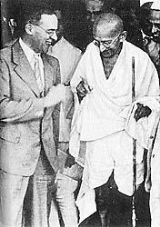
Labour politician
of the first half of the 20th century. During World War II
he served in a number of positions in the wartime coalition, including Ambassador to the Soviet Union
and Minister of Aircraft Production
. After the war he served in the Attlee Ministry, firstly as President of the Board of Trade and between 1947 and 1950 as Chancellor of the Exchequer
. In the latter position, Cripps was responsible for laying the foundations of Britain’s post-war economic prosperity, and was, according to the historian Eric Shaw, “the real architect of the rapidly improving economic picture and growing affluence from 1952 onwards.”
Cripps was born in London.
But it is a fallacy, if one is examining the methods by which security can be attained, to start upon the assumption, as so many hon. Members do, that we get security by an increase of air armaments or an increase of any other form of armaments.![]()
It is fundamental to Socialism that we should liquidate the British Empire as soon as we can.![]()
Every possible effort should be made to stop recruiting for the Armed Forces![]()
I do not believe it would be a bad thing for the British working class if Germany defeated us.![]()
The workers must now make it clear beyond all doubt that they will not support the Government or its armaments in its mad policy which it is now pursuing.![]()
Emphatically no, and I never have been.![]()

